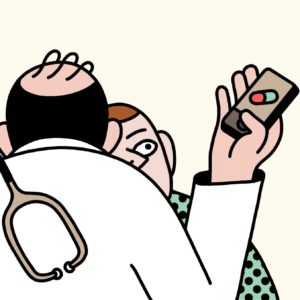Chrissy Farr in Technology Review (Can Digital Therapeutics Be as Good as Drugs?) this week pulls back the curtain on digital therapeutics, Silicon Valley’s latest angle in health.
Digital therapeutics, or “digiceuticals,” as some call them, have become a Holy Grail in some quarters of Silicon Valley, where investors see the chance to deliver medicine through your smartphone. Andreessen Horowitz, the venture firm, even predicts digital drugs will become “the third phase” of medicine, meaning the successor to the chemical and protein drugs we have now, but without the billion-dollar cost of bringing one to market.

The Andreesen concept of a third phase of medicine is compelling
And it plays well here. There is, however, a cavernous gap between a 99 cent app that makes evidence-based sleepy sounds and targeted biologic therapy for cancer. While the concept of a third phase of medicine may fit within a hyperlocal culture of giddy exponentialism, tech augmentation and biologic therapy are not mutually exclusive.
Digital therapeutics as innovation red meat
While it shouldn’t be news that non-pharmaceutical tools can help people manage disease, I have to admit that digital therapeutics is buzzy. In fact, I plan to indiscriminately throw the term around next week. Perhaps most importantly, the VCs driving the future of healthcare seem to like the sound of it.
In God we trust. All others must have data
Keep in mind that we should have little confidence in the data generated by these digital therapeutics companies. Until independently studied in a controlled fashion we must assume that everything cited here is no more effective than Candy Crush at treating its target disease.